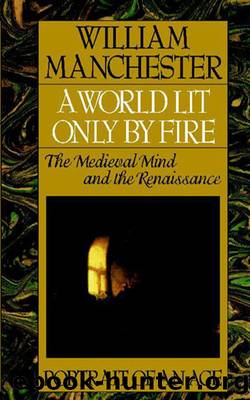A world lit only by fire: the medieval mind and the renaissance : portrait of an age by William Manchester

Author:William Manchester [William Manchester]
Language: eng
Format: epub
Tags: Histoire
ISBN: 9780316545310
Published: 1992-04-15T10:00:00+00:00
Emperor Charles V (Carlos I of Spain) (1500â1558)
it, shall be repaid without further delay.â Charles paidâmostly by giving Fugger the right to collect various royal revenues in Spain.
CHARLES HAD BEEN ELECTED, but his coronation was more than a year away. That was long enough to form alliances, declare and win wars, unseat dynasties âor nullify the choice of an emperorelect. Pope Leo, stubbornly refusing to concede defeat, continued to neglect his office, by persevering in his courtship of Frederick the Wise. He seemed prepared to endure the Wittenberg insubordination indefinitely, trusting that this lesser issue, which is how he regarded it, would yield to a peaceful solution. Lutheran ambivalence encouraged him in this. Even before Leipzig, Luther had been suffering through what might be called an identity crisis. He had been trying to define the papacy and his relationship to it. Meeting Von Miltitz in Altenburg in January 1919, he had appeared anxious to preserve the unity of Christendom, offering to remain mute if his critics would also. He was prepared to issue public statements acknowledging the wisdom of praying to saints and the reality of purgatory. He was also willing to urge his followers to make peace with the Church, and would even concede the usefulness of indulgences in remitting canonical penances. To Tetzel, lying on a monastic deathbed, he sent a gentle note, assuring him that the issue between them had been a minor incident in a larger controversy, âthat the affair had not been begun on that account, but that the child had quite another father.â In March he even sent the pontiff a letter of submission.
This was young Luther reduxâa flashback to the moment when, as a twenty-eight-year-old monk, he had first glimpsed the capital of Catholicism and prostrated himself. Then a devout pilgrim, he had genuflected before saintly relics, worshiped at every Roman altar, and scaled the Scala Santa on his knees. Now he wrote the Holy See in the same exalted mood. The response from the Vatican, prompt and friendly, invited him to Rome for confession. But by then Lutherâs inner struggle had resolved itself. Leoâs overture was declined once more. Wittenberg, after all, was still safer for an avowed recreant, and as the dark doppelganger within him reformed, he made his final, irrevocable turn away from Rome. The Luther who would make history was reemerging: willful, selfless, intolerant, pious, brilliant, contemptuous of learning and art, but powerful in conviction and driven by a vision of pure, unexploited Christianity.
In a brief, insightful passage he grasped this side of his temperament: âI have been born to war, and fight with factions and devils; therefore my books are stormy and warlike. I must root out the stumps and stocks, cut away the thorns and hedges, fill up the ditches, and am the rough forester to break a path and make things ready.â Thus, within a month of repledging his allegiance to the Holy Father he wrote Georg Spalatin, chaplain to Frederick: âI am at a loss to know whether the Pope is Antichrist or his apostle.
Download
This site does not store any files on its server. We only index and link to content provided by other sites. Please contact the content providers to delete copyright contents if any and email us, we'll remove relevant links or contents immediately.
| Ancient & Classical | Arthurian Romance |
| Beat Generation | Feminist |
| Gothic & Romantic | LGBT |
| Medieval | Modern |
| Modernism | Postmodernism |
| Renaissance | Shakespeare |
| Surrealism | Victorian |
4 3 2 1: A Novel by Paul Auster(11074)
The handmaid's tale by Margaret Atwood(6873)
Giovanni's Room by James Baldwin(5893)
Big Magic: Creative Living Beyond Fear by Elizabeth Gilbert(4734)
Asking the Right Questions: A Guide to Critical Thinking by M. Neil Browne & Stuart M. Keeley(4599)
On Writing A Memoir of the Craft by Stephen King(4221)
Ego Is the Enemy by Ryan Holiday(4000)
Ken Follett - World without end by Ken Follett(3981)
The Body: A Guide for Occupants by Bill Bryson(3814)
Bluets by Maggie Nelson(3722)
Adulting by Kelly Williams Brown(3680)
Guilty Pleasures by Laurell K Hamilton(3598)
Eat That Frog! by Brian Tracy(3525)
White Noise - A Novel by Don DeLillo(3443)
The Poetry of Pablo Neruda by Pablo Neruda(3371)
Alive: The Story of the Andes Survivors by Piers Paul Read(3320)
The Bookshop by Penelope Fitzgerald(3236)
The Book of Joy by Dalai Lama(3233)
Fingerprints of the Gods by Graham Hancock(3222)
